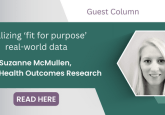Flatiron Health UK partners with leading NHS trust to transform cancer care with real-world data

University Hospitals of Leicester NHS Trust and Flatiron Health UK will work together to leverage real-world data (RWD) for cancer research, improving treatments and patient outcomes.
University Hospitals of Leicester NHS Trust (UHL), one of the UK’s largest acute hospital trusts, has announced a partnership with Flatiron Health UK. This collaboration aims to transform cancer patient records from Leicester, Leicestershire, and Rutland into high-quality, anonymized data, expanding research opportunities and improving cancer treatments.
With over 375,000 new cancer diagnoses in the UK annually, only 20% of patients participate in clinical trials, leaving crucial information from the remaining 80% untapped. This partnership seeks to convert RWD from patient records into research-ready datasets, expanding the scope of cancer research beyond traditional clinical trials.
The initiative, approved by the NHS Health Research Authority, will allow Flatiron Health UK to organize and anonymize unstructured cancer data, such as clinical letters and medical reports. A team of clinicians, epidemiologists, software engineers, and data scientists will curate these datasets for use by approved researchers in academia, the NHS, and industry.
Nigel Brunskill, Director of Research and Innovation at the University Hospitals of Leicester NHS Trust, emphasized the potential impact of the collaboration:
“We are committed to ensuring we are making best use of health data to develop and improve our research and clinical services. By collaborating with partners such as Flatiron Health UK, we can apply an evidence-based approach to significant health challenges to help with the development of new treatments which will improve outcomes for patients.”
Patient involvement is a key aspect of the project. Current and former cancer patients have contributed to establishing the partnership and will continue to be consulted. Patients will have the option to opt-out, and any previous opt-outs recorded through the NHS national data system will be respected.
The curated datasets will be returned to UHL to help identify patients at risk of symptoms worsening, treatment side effects, or relapse, improving individualized patient care. Only UHL will retain identifiable patient information, while the data used for research will be anonymized.
Dr Arun Sujenthiran, Clinical Lead and Medical Director at Flatiron Health UK, commented:
“Our work together will aim to drive foundational change in cancer research, understanding how treatments work in diverse populations, increase access to clinical trials, and support meaningful insights to a global cancer population.”
To ensure data security, all information will be stored in a secure data environment (SDE), accessible only to authorized researchers through a rigorous approval process overseen by an independent research transparency panel. Commercial organizations will pay a fee to access the datasets, with income shared with UHL for reinvestment in local cancer research and care. This initiative will not divert existing resources from other NHS services or cancer care.
This partnership builds on Flatiron Health UK’s recent collaboration with Leeds Teaching Hospitals NHS Trust and aligns with the UK government’s strategy to enhance the use of health data in research. As the project progresses, it has the potential to significantly impact cancer research and treatment, benefiting patients both locally and globally. Adam Manhi, Head of Network and Commercial Partnerships, Flatiron Health UK, stated:
“Flatiron UK’s partnership with the University Hospitals of Leicester NHS Trust is another step towards realizing our vision in the UK to learn from the experience of every person with cancer, offering more insights, more targeted care, and better outcomes. Together with UHL, we’ll aim to accelerate cancer research and improve the quality of care globally.”
Want regular updates on the latest real-world evidence news straight to your inbox? Become a member on The Evidence Base® today>>>






